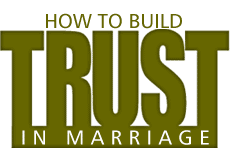 Vampire Weekend's Surprising Jewish Stories
Vampire Weekend's Surprising Jewish Stories


5 min read
Without trust in your marriage, you are headed for an abusive relationship (or may be in one already).
Trust is probably the most important ingredient in building an intimate relationship between husband and wife. Trust is something that can be cultivated and nurtured if you will follow the guidelines below.
I can sum up the essence of building trust in one idea: Create a safe emotional space for your spouse. If you are not actively working to build a safe emotional space, than you are probably building an unsafe one.
If you're not working to build a safe emotional space, then you're probably building an unsafe one.
A colleague of mine who is known for his wisdom as an educator in Los Angeles defines an abusive relationship in the following way. He suggests that an abusive relationship is one in which one person is afraid to express his or her feelings and opinions.
Needless to say, an abusive relationship is one where there is no trust. The key to avoiding abuse and promoting trust is to consciously strive everyday to build a safe emotional space. And let me say at the outset that, if you feel you are in an abusive relationship based on the definition I just gave, seek help immediately. Never tolerate abuse!
Guidelines for Creating Safe Emotional Space
Develop the skill of being a good listener, which is one of the hardest skills to develop.
Being a good listener means you don't interrupt your spouse. This requires great discipline and respect. Learn to ask, "Are you finished?" Always make sure you've fully understood what the other person has said.
A simple tool to use for this is the well known "mirroring technique." You reflect back what the other person has said. It may sound a bit contrived but, believe me, it really works. What you have to learn to do is say something like, "Let me make sure that I've understood what you just said. It sounded to me that you want me to..."
If you are an "advanced" listener, try not only to reflect back the content, but the emotional tone as well. For example, "It seems you are really annoyed with me and you want me to be more careful the next time I..."
A crucial component of good communication is the consistent use "I-statements" as opposed to "you-statements." I statements unite, while you-statements alienate and create distance. An I-statement begins with "I feel ... " A you-statement begins with "You make me feel..."
A you-statement is almost always experienced as an attack. When I own my feelings and opinions by using an I-statement, I am communicating that I am taking responsibility for the issue and not blaming my spouse.
When a person feels he or she cannot express their needs to the other person, then this leads to a break down in trust.
We often don't express our needs for two reasons. Either we are afraid of rejection or we are afraid of feeling ashamed for having such needs.
When a couple can express and meet each other's needs consistently this is one of the most powerful ways to build trust in a relationship.
We naturally trust people who treat us nicely and who seem to like us. It's very hard to distrust someone who seems to constantly be going out of his way to please you!
A key tool to use here is the "5 to 1 rule." This means that before you say anything negative to your spouse, you must have expressed at least five positive things. Only then, are you allowed to say something negative or critical.
This requires that a husband and wife develop good problem solving skills. I can't tell you how many couples I've worked with whose problems are rooted in a lack of problem solving skills.
When issues don't get resolved, then resentments develop and fester. And when resentments develop then trust is lost.
Just in case you didn't know, fighting is a part of any good marriage! I mention this because there are some people who live with the naïve notion that in "good marriages" couples never fight. The problem is not that couples fight, but how they fight.
If you fight unfairly, then you destroy trust. If you fight fairly, you build trust. Here are a few important pointers to make sure that when you fight, you fight fair:
Trust is one thing that takes a long time to build and a very short time to destroy. Be careful how you treat each other. Many people wrongly believe that in a good marriage, you can "relax" and not have to monitor everything you say and do. Nothing could be farther from the truth.
In a good marriage, you must always be monitoring your behavior. This is the key to building a strong relationship and trust.
